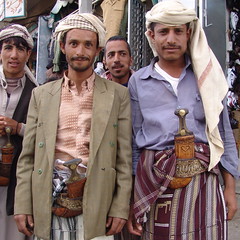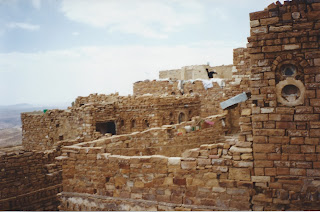 |
 by ~W~ by ~W~ |
According to our plan, if we wanted to continue living together, I would have to bid successfully on a job at the same or higher grade in either Abu Dhabi or Dubai after my next job. Since I was leaving the most senior level position in the administrative function, I would have to bid on a job outside my specialty as head of the consular, economic, or political sections or even as deputy chief of mission in Abu Dhabi or consul general in Dubai. The latter four positions required Arabic language competency and there was no way I would be a credible candidate for the jobs if I didn't already have the language. The Department didn't send out-of-specialty bidders for senior jobs to language training because there were too many uncertainties and too much time involved. Since it had been years since I had done any consular work, I wouldn't be a credible candidate for the head of the consular section whether or not I had Arabic language competency.
There were two possible administrative positions in the region that were language-designated which meant I could get the language training before going there - in Damascus and Sanaa. The Damascus job was a higher grade and Damascus was just that much further away that it would be more difficult to get away to the U.A.E. to spend time with Alex, putting two strikes against Damascus. Whether I wanted to go to Yemen or not (and I didn't), the job in Sanaa was the only one that both met the criteria and I had any hope of being assigned to.
We decided to make a trip to Sanaa from Abu Dhabi to see what I was getting into. The administrative oifficer in Sanaa, Howard, made arrangements for us that an official visitor would have reason to expect, but we were unofficially there. He picked us up at the airport, put us up in one of the embassy's leased apartments, and brought us to the embassy to meet people as well as traveled with us outside of the capital to see some of the countryside. This was much more than we had a right to expect.
Howard took us to a village about a half-hour's drive from Sanaa to see the sights and do some shopping in the souq. This village was well known for the number of school-aged children who could converse - and bargain - in multiple languages. They spoke English, French, German, Spanish, Italian, and probably Russian and a couple of other Slavic languages. The children would approach tourists, figure out which language the tourists spoke, and then lead the tourists down the narrow alleyways to the shopping area, providing commentary on the traditional architecture along the way. There wasn't much special in the souq, but the children provided entertainment worth the trip. Sadly, embassy staff members no longer can travel outside Sanaa without permission and armed escorts due to the deteriorating security situation in the region.
We went to dinner with the regional medical officer - the same medical officer who had Abu Dhabi as part of his regional responsibility - and his wife at a fish restaurant where the fish were swimming around in a tank, ensuring our meal would be fresh. The fish is baked in a clay oven right alongside the flat bread that is served with the fish. And we talked about the garbage that we just couldn't ignore. The RMO's wife said she had started going outside the walls of their house each day to sweep up the trash in front of the house. Initially she was greeted with stares from her neighbors. But one day she noticed another woman on her street outside the walls at the same time, also sweeping up the trash. There was hope.
There were two possible administrative positions in the region that were language-designated which meant I could get the language training before going there - in Damascus and Sanaa. The Damascus job was a higher grade and Damascus was just that much further away that it would be more difficult to get away to the U.A.E. to spend time with Alex, putting two strikes against Damascus. Whether I wanted to go to Yemen or not (and I didn't), the job in Sanaa was the only one that both met the criteria and I had any hope of being assigned to.
And that is what happened - I was assigned to Sanaa via one year of Arabic language training in Washington. And Alex planned to remain in Abu Dhabi.
At one point, I considered requesting approval to study Arabic in Sanaa so that Alex and I wouldn't be separated by such a great distance. One of the State employees in Abu Dhabi had done that. But I realized my reason - that I wanted to be closer to my husband - would be seen as a personal reason and the Department never approves arrangements for an employee's personal benefit.
 |
 by CharlesFred by CharlesFred |
When we arrived at the airport, things looked chaotic. It was our first view of the traditional Yemeni dress with men wearing what would be described as dresses or skirts, scarves on their head, sports coats worn over the ceremonial knife, the jambia, worn around the waist, with rifles over their shoulders. It was an intimidating introduction.
Once we got out of the airport and into a vehicle, all we could see was garbage. The roads were littered with trash. Not just paper, trash. The sides of the roads were full of trash. When we got into the city itself, it wasn't any better. Most houses had high walls around them, so we couldn't see what the grounds near the houses were like, but outside the walls, there was trash.
We hadn't gotten very far before Alex announced that he wasn't coming back.
At the embassy, we met the ambassador, Barbara Bodine, and the deputy chief of mission, Margaret Scobey. We talked about the possibility of my coming to Yemen for my language training. That might have been a way for me to make the case - if the embassy requested that I attend one of the language schools in Sanaa instead of going back to Washington. But it also raised my suspicions that I would end up working at the embassy and not get in the amount of studying I needed to master the language - the primary goal for bidding on the Sanaa job.].
While meeting with the two of them, Alex announced that he didn't see that there would be anything for him to do in Sanaa.
 |
| Village outside of Sanaa |
All along the way, there was garbage on the roads.
 |
| Alex in a village outside Sanaa |
Howard also took us to Sanaa's old city, the UNESCO heritage site the gates of which are one of the most recognizable of Yemen's views. As we made our way through the very narrow and twisting alleys, we popped into several of the shops where Howard introduced us to the shopkeepers. We weren't interested in buyng anything yet, but at one point Alex did announce to a shopkeeper that he would be interested in looking at one of the items later, when we returned to Sanaa.
We still couldn't ignore the trash. But we began to see beyond it to the adventures we had to look forward to.

No comments:
Post a Comment